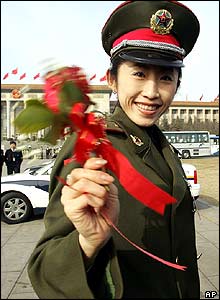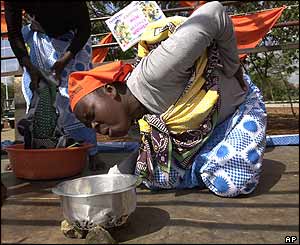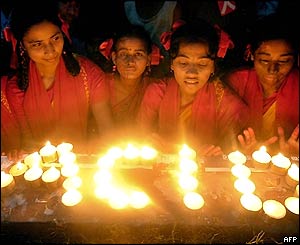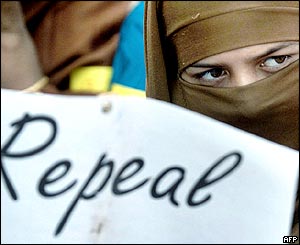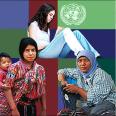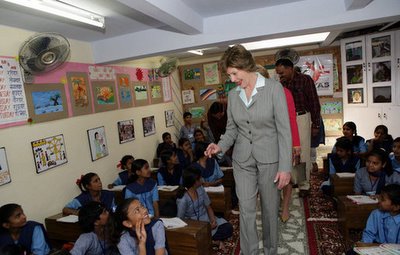

 International Women's Day News From around The World
International Women's Day News From around The World
International Women's Day 2006: Honoring women and girls around the worldJewels in the Jungle 23 hours ago Sokari Ekine , author of the Black Looks
blog and a contributing editor for Harvard's Global Voices Online blog project, has a magnificent roundup of international bloggers writing about African women on this ...
Sexual violence, abortion rights top Women's Day agenda Tens of...TurkishPress.com 22 hours ago
Pakistani high-profile gang rape victim Mukhtaran Mai leads an International Women's Day rally in Multan.
Mexican anti-harassment campaign features blowup sex dolls dressed as secretariesThe Tucson Citizen 20 hours ago / Mexico's National Women's Institute launched a series of ads on Wednesday that feature blowup sex dolls dressed as office workers, in a bid to counter sexual harassment in the workplace.
US marks International Women's Day as abortion battle heats upYahoo Yesterday / The United States marks International Women's Day deep in heated debate over
abortion after a state launched a legal challenge that could overturn the 1973 landmark Supreme Court ruling that made it lawful.
Bang Those Pots and Keep This Movement MovingWomensenews.org Yesterday / But before getting into that, let's think back to September 1995. Spin the globe and stop the world on China.
Turkish Digest 21 hours ago / Status of women in
Turkey: Black or white? European Union Enlargement "Status of women in Turkey: Black or white? In Short: The status of women in Turkey remains a moot point on the eve of the International ...
Welfare activist to speak in RenoReno Gazette-Journal Yesterday / If you go International Women's Day events: The International Women's Day Parade starts at noon in front of the Fitzgerald Student Services Building, adjacent to the Whalen Parking Complex.
Single mom, youth leader recognizedMississauganews.com 12 hours ago One is a single mother and former victim of domestic violence trying to obtain a nursing degree while raising two girls.
M2 Communications Ltd. Yesterday / Today's International Women's Day marks a fitting backdrop for the launch of a contemporary photographic collection celebrating the outstanding achievements of six world class
British women working in the ...
Vandals strike Little MermaidWGMS-FM Washington 16 hours ago / COPENHAGEN, Denmark, Mar 8, 2006 -- The much-vandalized Little Mermaid statue in Denmark has been struck again, this time as a message for Women's Rights Day.
Filipino protesters clash with policeReuters Video 23 hours ago Hundreds of mostly women protesters mark International Women's Day by calling on the Philippine President Gloria Arroyo to resign.Angry demonstrators, from leftist women's groups like Gabriela and Kababaihan, ...
Shaking hands with commoners is empowerment: sex workersIndia Gazette 20 hours ago Posted : 5 Hour,3 minutes Ago Pune, March 8 : Wearing colourful dresses and flowers, around 1,000 sex workers from ten districts of Maharashtra took out a rally here Wednesday shaking hands with people, which ...
We've come a long way, babyMississauganews.com Yesterday Today is International Women's Day and members of the fairer sex across
Mississauga will mark the occasion in a series of inspirational gatherings.
Women Denied Representation Making Poverty War Hard to WinCommon Dreams Yesterday / Millions of women around the world, including those in the UK and other Western countries, are being denied effective representation because of the low numbers of female politicians, judges and employers, the ...
Coalition calls for firing of firefighter in sex caseThe Spokesman-Review 21 hours ago A women's coalition which includes former
Spokane Mayor Sheri Barnard is calling for the firing of Daniel W. Ross, the 35-year old firefighter who had sex in a Spokane firehouse last month with a 16-year old ...
A look at women and warLee Northwest Yesterday TIFFANY BROWN/Gazette-Times Local photojournalist Cheryl Hatch, shows Jim Folts, her former
photography advisor at Oregon State University, new prints of her work from Eritrea.
Indonesian women rally against anti-pornography billAbc.net.au Yesterday
Indonesian women rally against anti-pornography bill PM - Wednesday, 8 March , 2006 18:48:00 Reporter: Peter Cave MARK COLVIN: Several hundred demonstrators took to the streets of Jakarta today to mark ...
2,000 Marchers Protest Acid Attacks on WomenLos Angeles Times Yesterday About 2,000 men marched in Bangladesh's capital ahead of today's observance of International Women's Day to protest acid attacks that permanently disfigure many women each year, organizers said.












